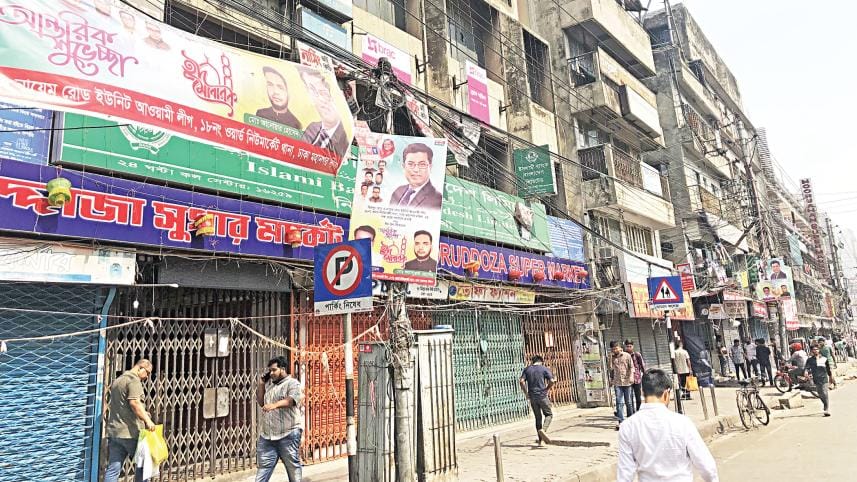Sales at neighbouring clothes hubs take a hit

Yesterday's blaze at Dhaka New Super Market has severely affected trade of nearby markets, that too with just a week to go before Eid-ul-Fitr.
Eid-ul-Fitr is one of the biggest religious festivals in Muslim-majority Bangladesh and the volume of clothing sales increases severalfold ahead of the festival.
Housing thousands of shops, Dhaka New Market, Chandrima Super Market, Noorjahan Super Market, Gausia Market, Noor Mansion Shopping Center, Chandni Chowk Shopping Complex, Dhanmondi Hawkers' Market, Nehar Bhaban, Badruddoza Super Marketand Globe Shopping Centre enable affordable Eid shopping for low and middle-income people.
Crowds usually throng the markets prior to Eid and it was expected to be especially busy due to it being the last weekend before the festival.
Instead, shoppers who were apparently oblivious of the fire were found returning home on finding shops shuttered till afternoon. From 3:00pm onwards some opened, but most remained closed.
While fighting the blaze since early morning, the fire service on megaphones had asked keeping the neighbouring stores shut.
Police had barricaded the road from the Science Lab intersection to Nilkhet area and from Bata Signal to New Market, primarily to enable the fire service to work uninterrupted.
Moreover, traders said power supply was deliberately kept disconnected as a safety measure.
With the April 4 Bangabazar fire just three kilometres away fresh in memory, this New Super Market blaze caused panic among the traders.
MA Hannan, one of the owners of Shoeb Fabrics, a cloth retailer adjacent to Gate No-1 of New Market, said they had to keep their shop shut.
"It's peak time for business. During this period, goods worth Tk 70,000 to Tk 80,000 are sold every day. Missing a day's sales is a great loss for us," he said.
"If we can open the shop on Sunday (today), we doubt whether we will see customers arrive," he added.
Billal Ahmed, a salesman of Jotey Garment at Noor Mansion Shopping Center, was found sitting idle on a stool in front of his shuttered shop around 1:00pm.
"We are waiting to open our shop but we don't know when we can open it," he said.
Another salesman, Mohammad Rana, of Jamdani House at Dhanmondi Hawkers' Market, spoke out about his panic about the fire. "Although the firefighters' sometimes came to the market and alerted us but it's too risky for us," he said.
A 40-year-old female wholesale trader arriving from Rampura area to procure some clothes was candid. "I knew that Dhaka's New Super Market was on fire. But I found the other markets closed," she said, unwilling to share her name.
Talking to The Daily Star over the phone, Abu Obayed Rony, owner of Fire Fashion, a retailer of readymade clothes at Noorjahan Super Market, just opposite to Dhaka College, said he was able to open his shop after 4:00pm.
Over the last few days, they had been able to make sales of around Tk 40,000 to Tk 50,000 every day from dawn to dusk. "But today (yesterday) I could not sell even one product," he said.
The fire might have created panic among the buyers. "It may affect us to some extent," he said.
Similarly, Mohammad Alauddin, a salesman of New Rajdhani Fashion at Nehar Bhaban, said they were able to open after 3:00pm.
Keeping the shop closed even for an hour during this period means a lot of financial losses as the sales volume increase every day, he said.
Around 500 shops were found to have been affected in primary assessment, of which 280 to 300 were burnt down while the rest suffered water damage, said Maruf Hossain, convener of an association of shop owners of Dhaka New Super Market (south building).
The building houses some 1,300 shops in total.
Usually, sales of around Tk 40 crore to Tk 50 crore are made every day in the building during the last 10 days to Ramadan, he said.
According to Dewan Aminul Islam Shahin, president of Dhaka New Market Business Association, there were over 10,000 shops between the Science Laboratory intersection and Gausia Market.
Several nearby markets were closed due to the fire and that is why the traders have suffered irreparable losses, he said.
The last eight to 10 days to Ramadan is the peak period for sales and the traders have invested a lot of money targeting this period, he said.
Eid-ul-Fitr sales amount to at least Tk 80,000 to Tk 1 lakh for each of the shops so one can estimate the loss when they were closed for a large part of the day, he added.





 For all latest news, follow The Daily Star's Google News channel.
For all latest news, follow The Daily Star's Google News channel.
Comments